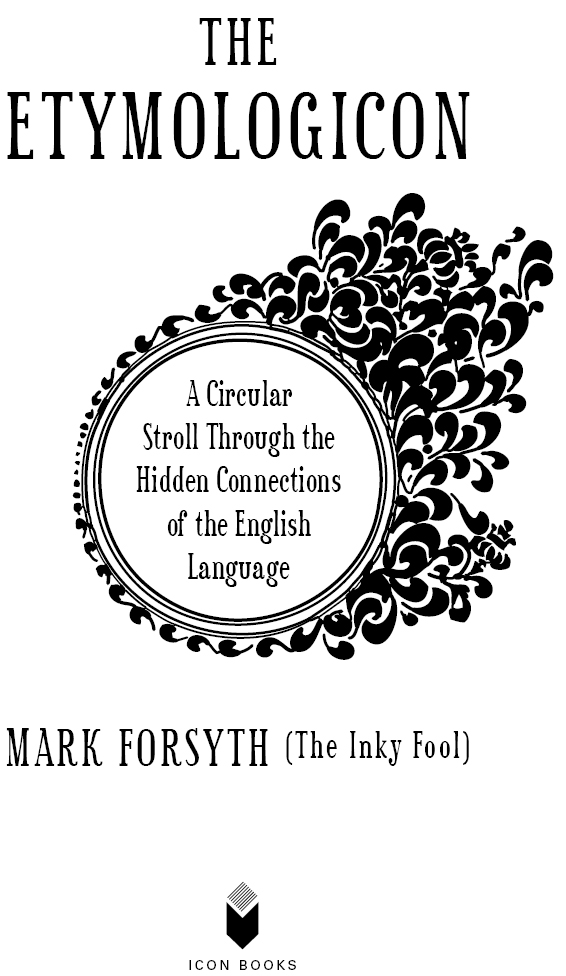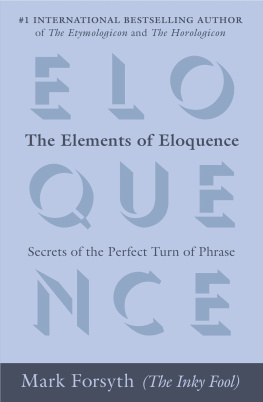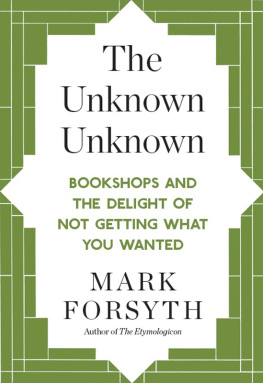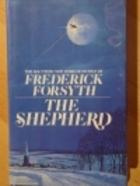Mark Forsyth - The Etymologicon: A Circular Stroll Through the Hidden Connections of the English Language
Here you can read online Mark Forsyth - The Etymologicon: A Circular Stroll Through the Hidden Connections of the English Language full text of the book (entire story) in english for free. Download pdf and epub, get meaning, cover and reviews about this ebook. year: 2012, publisher: Icon Books, genre: Detective and thriller. Description of the work, (preface) as well as reviews are available. Best literature library LitArk.com created for fans of good reading and offers a wide selection of genres:
Romance novel
Science fiction
Adventure
Detective
Science
History
Home and family
Prose
Art
Politics
Computer
Non-fiction
Religion
Business
Children
Humor
Choose a favorite category and find really read worthwhile books. Enjoy immersion in the world of imagination, feel the emotions of the characters or learn something new for yourself, make an fascinating discovery.

- Book:The Etymologicon: A Circular Stroll Through the Hidden Connections of the English Language
- Author:
- Publisher:Icon Books
- Genre:
- Year:2012
- Rating:5 / 5
- Favourites:Add to favourites
- Your mark:
- 100
- 1
- 2
- 3
- 4
- 5
The Etymologicon: A Circular Stroll Through the Hidden Connections of the English Language: summary, description and annotation
We offer to read an annotation, description, summary or preface (depends on what the author of the book "The Etymologicon: A Circular Stroll Through the Hidden Connections of the English Language" wrote himself). If you haven't found the necessary information about the book — write in the comments, we will try to find it.
Mark Forsyth: author's other books
Who wrote The Etymologicon: A Circular Stroll Through the Hidden Connections of the English Language? Find out the surname, the name of the author of the book and a list of all author's works by series.
The Etymologicon: A Circular Stroll Through the Hidden Connections of the English Language — read online for free the complete book (whole text) full work
Below is the text of the book, divided by pages. System saving the place of the last page read, allows you to conveniently read the book "The Etymologicon: A Circular Stroll Through the Hidden Connections of the English Language" online for free, without having to search again every time where you left off. Put a bookmark, and you can go to the page where you finished reading at any time.
Font size:
Interval:
Bookmark:
![]()

Previously published in the UK in 2011 by
Icon Books Ltd, Omnibus Business Centre,
3941 North Road, London N7 9DP
email:
www.iconbooks.co.uk
This electronic edition published in the UK in 2011 by Icon Books Ltd
ISBN: -- 84831 --4 (ePub format)
ISBN: -- 84831 --0 (Adobe ebook format)
Printed edition (ISBN: - 184831 --1)
Sold in the UK, Europe, South Africa and Asia
by Faber & Faber Ltd, Bloomsbury House,
7477 Great Russell Street,
London WC1B 3DA or their agents
Printed edition distributed in the UK, Europe, South Africa and Asia
by TBS Ltd, TBS Distribution Centre, Colchester Road,
Frating Green, Colchester CO7 7DW
Printed edition published in Australia in 2011 by Allen & Unwin Pty Ltd,
PO Box 8500, 83 Alexander Street,
Crows Nest, NSW 2065
Printed edition distributed in Canada by Penguin Books Canada,
90 Eglinton Avenue East, Suite 700,
Toronto, Ontario M4P 2YE
Printed edition published in the USA in 2011 by Totem Books
Inquiries to: Icon Books Ltd, Omnibus Business Centre,
3941 North Road, London N7 9DP, UK
Printed edition distributed to the trade in the USA
by Consortium Book Sales and Distribution
The Keg House, 34 Thirteenth Avenue NE, Suite 101
Minneapolis, Minnesota 55413 - 1007
Text copyright 2011 Mark Forsyth
The author has asserted his moral rights.
No part of this book may be reproduced in any form, or by any means, without prior permission in writing from the publisher.
Typeset by Marie Doherty
Mark Forsyth is a writer, journalist, proofreader, ghostwriter and pedant. He was given a copy of the Oxford English Dictionary as a christening present and has never looked back.
In 2009 he started the Inky Fool blog, in order to share his heaps of useless information with a verbose world.
For John Goldsmith,
With thanks.
The author would like to thank everybody involved with the production of this book, but especially Jane Seeber and Andrea Coleman for their advice, suggestions, corrections, clarifications and other gentle upbraidings.
they who are so exact for the letter shall be dealt with by the Lexicon , and the Etymologicon too if they please
JOHN MILTON
This book is the papery child of the Inky Fool blog, which was started in 2009. Though most of the material is new some of it has been adapted from its computerised parent. The blog is available at http://blog.inkyfool.com/ which is a part of the grander whole www.inkyfool.com.
(or that which is said fatus before)
Occasionally people make the mistake of asking me where a word comes from. They never make this mistake twice. I am naturally a stern and silent fellow; even forbidding. But theres something about etymology and where words come from that overcomes my inbuilt taciturnity. A chap once asked me where the word biscuit came from. He was eating one at the time and had been struck by curiosity.
I explained to him that a biscuit is cooked twice, or in French bi-cuit , and he thanked me for that. So I added that the bi in biscuit is the same bi that you get in bicycle and bisexual , to which he nodded. And then, just because it occurred to me, I told him that the word bisexual wasnt invented until the 1890s and that it was coined by a psychiatrist called Richard von Krafft - Ebing and did he know that Ebing also invented the word masochism ?
He told me firmly that he didnt.
Did he know about Mr Masoch, after whom masochism was named? He was a novelist and
The fellow told me that he didnt know about Mr Masoch, that he didnt want to know about Mr Masoch, and that his one ambition in life was to eat his biscuit in peace.
But it was too late. The metaphorical floodgates had opened and the horse had bolted. You see there are a lot of other words named after novelists, like Kafkaesque and Retifism
It was at this point that he made a dash for the door, but I was too quick for him. My blood was up and there was always something more to say. There always is, you know. Theres always an extra connection, another link that joins two words that most of mankind quite blithely believe to be separate, which is why that fellow didnt escape until a couple of hours later when he managed to climb out of the window while I was drawing a diagram to explain what the name Philip has to do with a hippopotamus.
It was after an incident such as this that my friends and family decided something must be done. They gathered for a confabulation and, having established that secure psychiatric care was beyond their means, they turned in despair to the publishing industry, which has a long history of picking up where social work leaves off.
So, a publisher was found somewhere near the Caledonian Road and a plan was hatched. I would start with a single word and then connect it to another word and then to another word and so on and so forth until I was exhausted and could do no more.
A book would therefore have a twofold benefit. First it would rid me of my demons and perhaps save some innocent conversationalist from my clutches. Second, unlike me, a book could be left snugly on the bedside table or beside the lavatory: opened at will and closed at will.
So a book it was, which set me thinking
This is a book. The glorious insanities of the English language mean that you can do all sorts of odd and demeaning things to a book. You can cook it. You can bring a criminal to it, or, if the criminal refuses to be brought, you can throw it at him. You may even take a leaf out of it, the price of lavatory paper being what it is. But there is one thing that you can never do to a book like this. Try as and how you might, you cannot turn up for it. Because a turn-up for the books has nothing, directly, to do with the ink - glue - and - paper affair that this is (that is, unless youre terribly modern and using a Kindle or somesuch). Its a turn-up for the bookmakers .
Any child who sees the bookmakers facing the bookshop across the High Street will draw the seemingly logical conclusion. And a bookmaker was, once, simply somebody who stuck books together. Indeed, the term bookmaker used to be used to describe the kind of writer who just pumps out one shelf - filler after another with no regard for the exhaustion of the reading public. Thomas More observed in 1533 that of newe booke makers there are now moe then ynough. Luckily for the book trade, More was beheaded a couple of years later.
The modern sense of the bookmaker as a man who takes bets originated on the racecourses of Victorian Britain. The bookmaker would accept bets from anyone who wanted to lay them, and note them all down in a big betting book. Meanwhile, a turn - up was just a happy chance. A dictionary of slang from 1873 thoughtfully gives us this definition:
Turn up an unexpected slice of luck. Among sporting men bookmakers are said to have a turn up when an unbacked horse wins.
So, which horses are unbacked? Those with the best (i.e. longest) odds. Almost nobody backs a horse at 1,000/1.
This may seem a rather counterintuitive answer. Odds of a thousand to one are enough to tempt even a saint to stake his halo, but thats because saints dont know anything about gambling and horseflesh. Thousand to one shots never, ever come in. Every experienced gambler knows that a race is usually won by the favourite, which will of course have short odds. Indeed, punters want to back a horse thats so far ahead of the field he merely needs to be shooed over the line. Such a horse is a shoo-in .
Font size:
Interval:
Bookmark:
Similar books «The Etymologicon: A Circular Stroll Through the Hidden Connections of the English Language»
Look at similar books to The Etymologicon: A Circular Stroll Through the Hidden Connections of the English Language. We have selected literature similar in name and meaning in the hope of providing readers with more options to find new, interesting, not yet read works.
Discussion, reviews of the book The Etymologicon: A Circular Stroll Through the Hidden Connections of the English Language and just readers' own opinions. Leave your comments, write what you think about the work, its meaning or the main characters. Specify what exactly you liked and what you didn't like, and why you think so.







